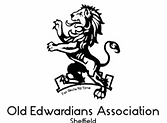top of page

OLD EDWARDIANS' ASSOCIATION
Captain Philip L Burkinshaw
Philip Lewys Burkinshaw was born in 1922 in Wakefield and educated at King Edward VII School. He became a cadet in the University Senior Training Corps in 1941, joining the Royal Corps of Signals at the end of his university year.
In 1942 he was commissioned into the Duke of Wellington’s Regiment and posted to Norfolk, where he was given command of a platoon in A Company. In 1943 Burkinshaw volunteered for the Parachute Regiment, despite being afraid of heights. He attended parachute training at RAF Ringway in October 1943, undertaking ground training and jumps from balloons. He recalled: ‘Balloon jumping was, I always found, a rather nerve testing, cold blooded experience – surprisingly perhaps – less so at night. The balloon was certainly not a popular innovation and was responsible for many would be parachutists failing to stay the course.’
Burkinshaw was posted to the 12th (Yorkshire) Parachute Battalion as Commander of No 1 Platoon, A Company, and spent early 1944 training on Salisbury Plain. In May 1944 preparations began for D Day, where it was the task of the 12th Bn to take the village of Le Bas de Ranville and hold the area. On 5 June 1944 the Battalion prepared to parachute into France: ‘Shortly before 11 pm we fell in by platoons and boarded lorries to take us to Keevil airfield. On our arrival there we found a scene of enormous activity and bustle and were directed to our aircraft, debussing alongside the Stirlings, their fuselages towering high above us. After last minute checks of arms and equipment, anointing of our faces and hands with camouflage cream mixed with soot, synchronization of watches by platoon commanders – important in the split second world in which we were to live or die – last minute words of reassurance or explanation for those who might be in any doubt or uncertainty, we boarded our aircraft.’
Dropped close to the RV, Burkinshaw regrouped with his platoon and proceeded to Ranville. Moving down the west bank of the river, he was wounded in the abdomen and evacuated; first to the Main Dressing Station in Ranville, then on 11 June to a Tank Landing Craft which took him back to Southampton. Although not fully recovered from his wound, Burkinshaw returned to his Battalion in December 1944 in time to join the British troops in the Ardennes. In January 1945 the Battalion moved to the River Maas in Holland, where Burkinshaw recalled that ‘one could not move about by day because of the presence of the enemy – elements of the German 7th Parachute Division – in buildings on the opposite side of the river, in some cases only a few hundred yards distant.’
Burkinshaw was recalled to Britain with the rest of the 12th Bn in February 1945 to prepare for Operation Varsity with the 6th Airborne Division and the America 17th Airborne Division. The 12th Bn were given three weeks for training for the Rhine Crossing operation. It was Burkinshaw’s opinion that ‘this was to be an entirely different proposition to D Day- more clear cut certainly and less scope for getting lost, but we would be very vulnerable in such a huge formation in daylight.’ As his stick prepared to jump from the Dakota, his concerns were justified: ‘I moved to the open door and standing there it was soon evident from the sharp flak that our landing was going to be hotly opposed…I was not sorry when the green light came on indicating that it was time to go and I was able to leave the plane as I felt very vulnerable standing in the open door of a plane being shot at by anti-aircraft guns. On the way down there was a fair amount of shrapnel flying about, but I and most of the stick made it safely to terra firma.’ From 24 March to 1 May, the Battalion advanced 400 miles into Germany, reaching Mecklenburg and Wismar just before the Russian Army.
On returning to Britain, Burkinshaw was again admitted to hospital for treatment of the wound he received in Ranville. It was due to this that he was not with the 12th Bn on its departure to the Far East, and instead joined the 9th Battalion in Palestine in 1945, becoming Captain in command of HQ Company in 1946. Burkinshaw returned to Britain in September 1946, and was released from the army. He re-enrolled at Sheffield University, and in 1947 joined the Hallamshire Battalion. In 1949 he obtained an Honours Degree in Spanish and Portuguese from Sheffield University, he then joined the Colonial Administrative Service, serving in Sierra Leone, Gambia and Nyasaland and later as a Deputy Provincial Commissioner.
Philip Burkinshaw joined the Corps of Queens Messengers in 1969 and in 1976 was seconded for duty with the Pearce Commission to Rhodesia. He retired in 1982 when a member of the FCO Security Department. He was Mentioned in Dispatches for his actions at Ranville, and was later awarded an OBE, as well as writing a book ‘Alarms and Excursions’, with a foreword by General Sir Kenneth Darling GBE, KCB, DSO.
Philip Burkinshaw died on 24 June 2014 aged 92.
Extracts taken from Alarms and Excursions by Philip L Burkinshaw
By Rebecca Blackburn with information supplied by Philip Burkinshaw

bottom of page